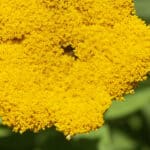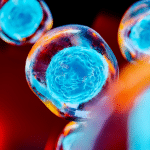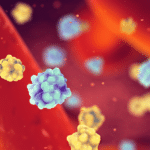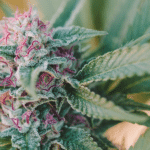Graft-versus-host disease (GVHD) is a common – and potentially fatal – complication following bone marrow and solid organ transplants. This life threatening condition can also occur after a patient receives a blood transfusion or other forms of transplanted tissue from a genetically different person.
The mortality rate for acute GVHD is over 80 percent. And there are no reliable molecular markers that indicate the onset or reflect the severity of a post-transplant reaction. Currently there are no FDA-approved therapies for this disease. The ability to treat acute GVHD is thus a major unmet medical need.
But hope is on the horizon, thanks to cannabidiol (CBD), a non-intoxicating component of cannabis, according to a team of Israeli scientists at the Rabin Medical Center. Data from three phase 2 clinical studies in Israel showed dramatic results when 150 mg of pure CBD was orally administered twice daily to ten patients with acute GVHD who did not respond to steroids. Although the sample size was small, the outcome proved noteworthy: “Consumption was safe and no significant adverse effects were reported. Nine out of ten patients responded to treatment, seven of them achieved complete remission and two achieved very good partial response.”
The Israeli study, “Cannabidiol – An innovative strategy for the treatment of graft versus host disease,“ was featured on Day One of the 2018 International Cannabinoid Research Society conference, which convened this summer in the picturesque Dutch city of Leiden. Over 500 delegates from around the world attended the annual four-day gathering, where they discussed cutting-edge developments in cannabis science and medicine.
This year’s ICRS conference featured 58 oral presentations, including four keynotes, and 235 posters that covered a wide range of topics. CBD figured prominently in many of these reports, which also explored the health benefits of tetrahydrocannabinol (THC) and other plant cannabinoids. But the main focus, as always, was on the endocannabinoid system itself, which mediates many of the effects of cannabis.
THC & CBD for Brain Health
Andras Bilkei-Gorzo, a University of Bonn scientist, linked brain aging to a decline in activity of the endocannabinoid system (characterized by diminished endocannabinoid levels and reduced coupling with CB1 cannabinoid receptors). But animal models showed that normal, age-related, cognitive decline can be counteracted with a chronic low dose of THC: “Most strikingly, THC treatment facilitated a rebalanced hippocampal gene transcription in old mice so that their expression profiles closely resembled that of young THC-free animals … Thus, restoration of CB1 signaling in old individuals could be an effective strategy to treat or prevent age-related cognitive impairments.”
The neuroprotective properties of plant cannabinoids were noted in several other presentations at ICRS 2018:
- Alzheimer’s. Australian scientists reported that chronic CBD treatment (50mg/kg) reversed cognitive deficits in animal models of Alzheimer’s. [Keep in mind that this dosage pertains to pure single-molecule CBD, whereas whole plant, full spectrum CBD-rich oils are effective at much lower doses.]
- Parkinson’s. Brazilian researchers found that 30 mg/kg of pure CBD reduced the loss of dopaminergic neurons in the brain regions implicated in Parkinson’s.
- Epilepsy. Researchers at the University of Sydney, working with a mouse model of Dravet Syndrome, an infant seizure disorder, found that “sub-threshold CBD” potentiated “the anticonvulsant potential of THC.”
- Stroke. A University of Nottingham (UK) team determined that cannabidiolic acid (CBDA, the raw version of cannabidiol that exists in the plant before it is harvested, heated and decarboxylated into CBD), acting through the 5-HT1A serotonin receptor, is neuroprotective in a cellular model of a stroke.
- Neonatal brain trauma. Spanish scientists studied CBD’s neuroprotective properties in a neonatal rat model of hypoxia ischemia (brain damage from oxygen and nutrient restriction) and linked these effects to the CB2 cannabinoid receptor. The researchers surmised that there was no “direct action of CBD on CB2 receptors,” but noted that the data was consistent with the possible involvement of “CB2/5-HT1A heteromers.” Heteromers occur when different receptors conjoin to form novel signaling mechanisms – in this case, the CB2 cannabinoid receptor (which CBD does not activate) and 5-HT1A, a key serotonin receptor (which CBD activates).
CBD Synergies
Clara Andradas, a medical scientist at the Telethon Kids Institute in Western Australia, has been researching potential applications of cannabinoids for treating pediatric cancer, specifically malignant brain tumors. Her poster disclosed that CBD and THC reduced the viability of brain cancer cells, an effect mediated in part by the CB2 cannabinoid receptor. Moreover, “the combination of cannabinoids with conventional chemotherapies enhances the anti-proliferative effects in these cells,” she concluded.
Temple University scientists assessed the therapeutic impact of CBD combined with beta-caryophyllene (BCP), a versatile terpene present in many cannabis cultivars, kitchen spices, and green vegetables. Unlike cannabidiol, BCP directly activates the CB2 receptor, which modulates immune function and neuroprotection in response to brain trauma. The two compounds together “showed a statistically significant reduction in infarct size,” according to the investigators, who concluded that “combination therapies can provide a greater benefit than single treatments alone” and should be explored further for treating ischemic stroke and other diseases.
Mark Lewis, a plant scientist with Napro Research in California, provided additional evidence that whole plant cannabis medicine may be more efficacious than pure, single-molecule cannabinoids. Lewis has bred several CBD-rich and BCP-rich cannabis chemovars. In vitro analysis showed that various CBD–BCP ratios inhibited cellular inflammation. Co-administration of CBD and BCP “produced enhanced effects as compared to each compound alone.” Of particular interest, the anti-inflammatory impact “produced by certain CBD concentrations increased by up to ten times when co-administered with certain concentrations of BCP.”
Anecdotal accounts from cannabis consumers attest to the benefits of artisanal, terpene-rich remedies. Whistler Therapeutics, a boutique medical marijuana company in British Columbia, surveyed Canadian patients to assess the analgesic impact of different aromatic terpenes in cannabis. Imbued with their own medicinal properties, terpenes interact synergistically with CBD, THC and other plant cannabinoids. For pain management purposes, the best results were obtained using cannabis varietals with noteworthy concentrations of myrcene and trans-nerolidol.
Martin A. Lee is the director of Project CBD. He’s authored and edited several books, including Smoke Signals, Acid Dreams, and The Essential Guide to CBD. © Copyright, Project CBD. May not be reprinted without permission.







